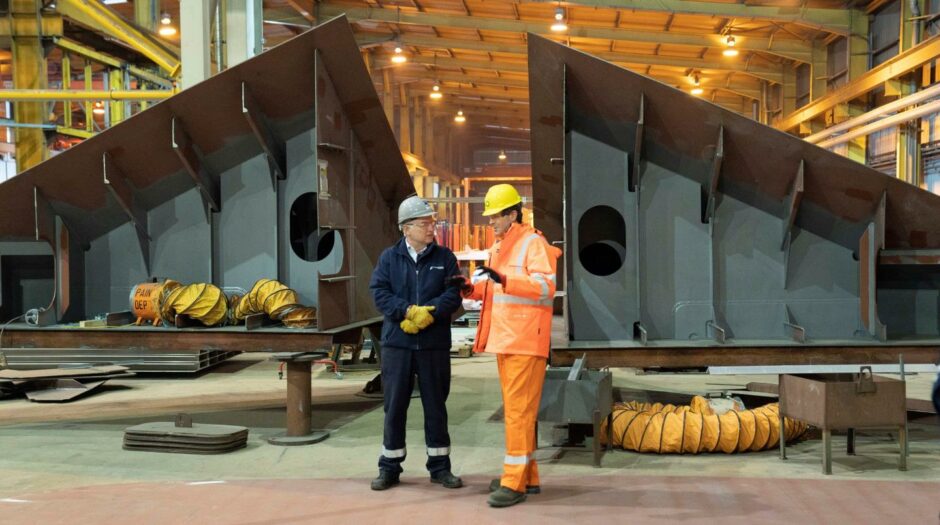
Energy giant BP has dangled another big bauble in front of those who will decide the fate of its ScotWind offshore wind bid, with jobs hopes from new Scottish-built ships.
The company did a scoping visit to shipyards in Fife and the Glasgow area yesterday (December 6), revealing ambitions to build four new vessels to service wind farm projects in the North Sea and Irish Sea.
They are part of a potential £10 billion investment package to make Scotland a global leader in offshore wind and accelerate the country’s energy transition.
Crown Estate Scotland aims to make initial offers to successful applicants to its ScotWind bidding auction in January.
BP and German company EnBW have submitted a joint bid which, if successful, would see them build a 2.9-gigawatt wind farm in the North Sea.
They say their plans will support thousands of jobs in the Scottish energy sector and supply chain, and also develop new energy transition jobs, skills and capabilities.
ScotWind success is also expected to deliver a bounty worth around £40 million annually to the Aberdeen economy, and create up to 120 jobs in and around the city.
BP and EnBW revealed details of their shipbuilding ambitions after a tour of two Scottish yards – Babcock International at Rosyth and Ferguson Marine at Port Glasgow.
Richard Haydock, project director for BP’s Irish Sea wind farm leases, said: “We are very impressed with what we have seen. today.
“We looking forward to, hopefully, coming back for the next stage of discussions.”
But the strong show of support for Scottish shipbuilding capability came with a warning that BP may look elsewhere for new vessels to support its Morgan and Mona offshore wind projects in the Irish Sea if it fails in its ScotWind bid.
Felipe Arbelaez, senior vice-president, zero-carbon energy, BP, said: “We would have to “evaluate all options.”
Four new ships are planned – two offshore support vessels and two for crew transfers.
Mr Haydock said two of them – one of each kind – would likely be based on the east coast if the ScotWind bid succeeds.
Construction of the vessels in Scotland would support an estimated 500 jobs, BP said.
Granite City at the heart of BP’s offshore wind plans
Aberdeen, where BP is the city council’s preferred bidder and commercial partner to build Scotland’s first scalable green hydrogen production plant, will host a new centre of excellence for offshore wind, as well as an operations and maintenance facility under the BP-EnBW plans.
The joint ScotWind bid goes far beyond the delivery of offshore wind development.
It is also expected to deliver significant investment in Scotland’s energy transition, including electric vehicle charging, green hydrogen, support for ports and reskilling.
Ferguson Marine turnaround director Tim Hair said the Port Glasgow yard was ready for the task of building the vessels.
“We’re very confident we can produce the ships that are required,” Mr Hair said, adding: “There would be a skills base available to BP.”
Ferguson Marine is the firm behind two over-budget and delayed ferries being built for Caledonian MacBrayne.
The Scottish Government saved the company in 2019 after it plunged into administration.
BP is “actively looking” at low-carbon technologies for its four new vessels, Mr Haydock said.
Mr Arbelaez added the company was also still mulling over how it would finance them.
Recommended for you

 © Supplied by BP
© Supplied by BP